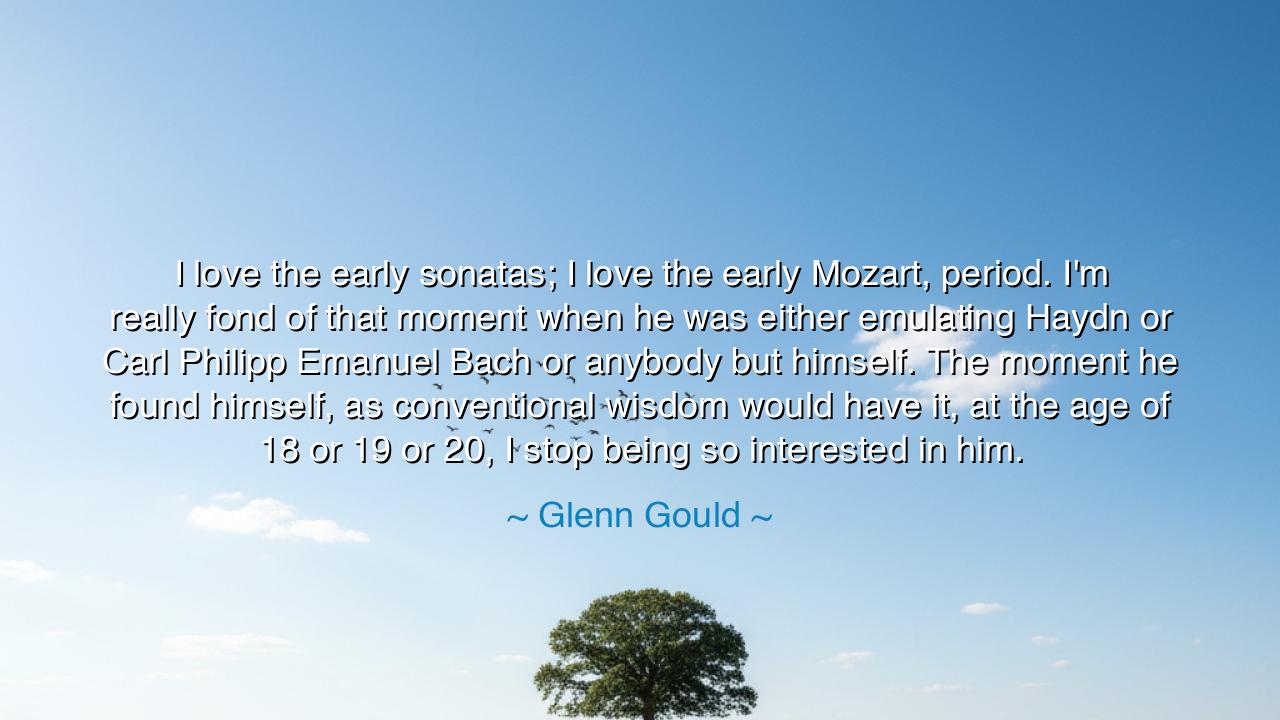
I love the early sonatas; I love the early Mozart, period. I'm
I love the early sonatas; I love the early Mozart, period. I'm really fond of that moment when he was either emulating Haydn or Carl Philipp Emanuel Bach or anybody but himself. The moment he found himself, as conventional wisdom would have it, at the age of 18 or 19 or 20, I stop being so interested in him.






“I love the early sonatas; I love the early Mozart, period. I'm really fond of that moment when he was either emulating Haydn or Carl Philipp Emanuel Bach or anybody but himself. The moment he found himself, as conventional wisdom would have it, at the age of 18 or 19 or 20, I stop being so interested in him.”
Thus spoke Glenn Gould, the brilliant and eccentric interpreter of Bach, whose fingers and mind seemed born from another world. In these words, he reveals a paradoxical truth: that in imitation, there is a purity, and that in self-discovery, something of that purity is lost. To love the young Mozart, the imitator, is to love the fragile dawn of genius—the sacred time when the artist listens, absorbs, and reaches outward toward others, before the echo of the self becomes too loud to hear anything else. Gould reminds us that creation, at its deepest, is not the cry of the ego, but the reverent whisper of a soul still in awe of the world.
When Gould praises the early sonatas, he is not speaking merely as a critic of music, but as a philosopher of becoming. The child Mozart, shaped by the hands of his father and the spirits of Haydn and C.P.E. Bach, was not yet the “great Mozart” the world now worships. He was a vessel—open, curious, and humble before the beauty that surrounded him. Gould found in that humility something divine. He saw in those early works the tremor of a mind learning the language of creation, unafraid to borrow, to imitate, to bow before the masters who came before. For him, this was not weakness, but the very essence of art—that the artist must first learn to echo before he dares to speak.
In the ancient world, the same truth was honored. The philosopher Plato wrote that learning begins in imitation; the young must copy before they can create. The sculptors of Greece first carved from the models of their teachers before daring to shape the gods in their own image. Even the mighty Homer, if he lived at all, drew upon older oral traditions, weaving the voices of countless unknown poets into the Iliad and Odyssey. Gould’s admiration for the “emulating” Mozart carries that same reverence: that genius is not born whole, but unfolds through imitation—through surrender to something greater than oneself.
And yet, Gould’s confession bears a melancholy shadow. For when Mozart, as Gould says, “found himself,” when he ceased to imitate and began to compose with the effortless confidence of mastery, something in his art ceased to move Gould’s spirit. To Gould, this “mature” Mozart had become too self-assured, too fluent in his own beauty. The music, though perfect, had lost the trembling uncertainty that once made it alive. It is the tragedy of mastery—that the struggle disappears, and with it, a certain innocence. Gould saw in early Mozart not perfection, but becoming; not completion, but the holy restlessness of growth.
Consider the artist Vincent van Gogh, who, in his early years, painted in dull browns, copying the style of his Dutch predecessors. Those early works are raw, clumsy, and searching. Yet within them burns a yearning so human it pierces the soul. Later, when his own style blazed forth—those swirling blues and yellows that now hang in temples of art—he was indeed himself, but also doomed by his own brilliance. The act of imitation had kept him connected to others; mastery left him alone with his genius. So too with Mozart in Gould’s eyes: once the world declared him a master, he ceased to reach outward, and turned wholly inward.
Gould’s insight, though spoken of music, speaks also to the journey of the spirit. In youth, we imitate the wise; we borrow voices, gestures, dreams. We are apprentices in the grand workshop of the world. Then comes the age of independence, when we cast aside our teachers and proclaim our own name. But beware, Gould whispers across the centuries: to “find yourself” is not always to find truth. There is wisdom in imitation, in humility, in remaining open to learning, even when the world calls you accomplished. The river that stops flowing becomes stagnant; the artist who stops listening begins to decay.
Therefore, let this lesson be passed down as a gentle warning to all who create and to all who seek mastery: never lose the wonder of the beginner. Remember the trembling joy of imitation, for it is the root of learning. To emulate is not to copy blindly, but to honor those who came before, to weave their light into your own. Genius, stripped of humility, becomes vanity; but genius that listens remains alive. As Glenn Gould teaches through his love of early Mozart, it is not perfection we should revere, but the honest struggle toward it—the striving heart, the open hand, the beautiful incompleteness of becoming.
Practical teaching: Stay a student forever. Study the masters, revere the craft, and never believe that you have “arrived.” In every art, in every field, imitate first with reverence, then create with humility. Seek not only your own voice, but the harmony between yours and the world’s. For the moment you think you are finished learning, you cease to live. And the spirit that imitates with awe—like the young Mozart—remains forever alive, curious, and divine.






AAdministratorAdministrator
Welcome, honored guests. Please leave a comment, we will respond soon